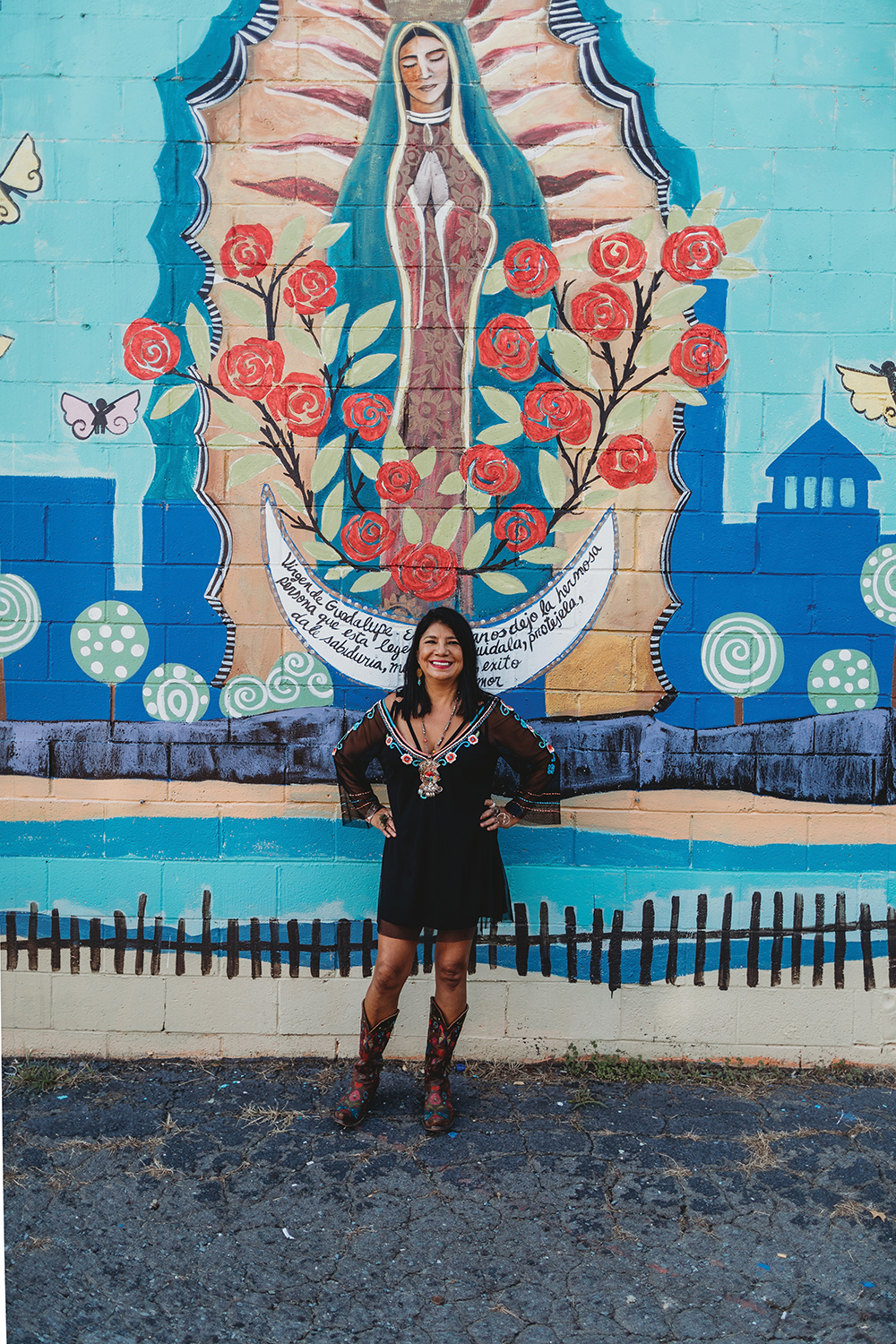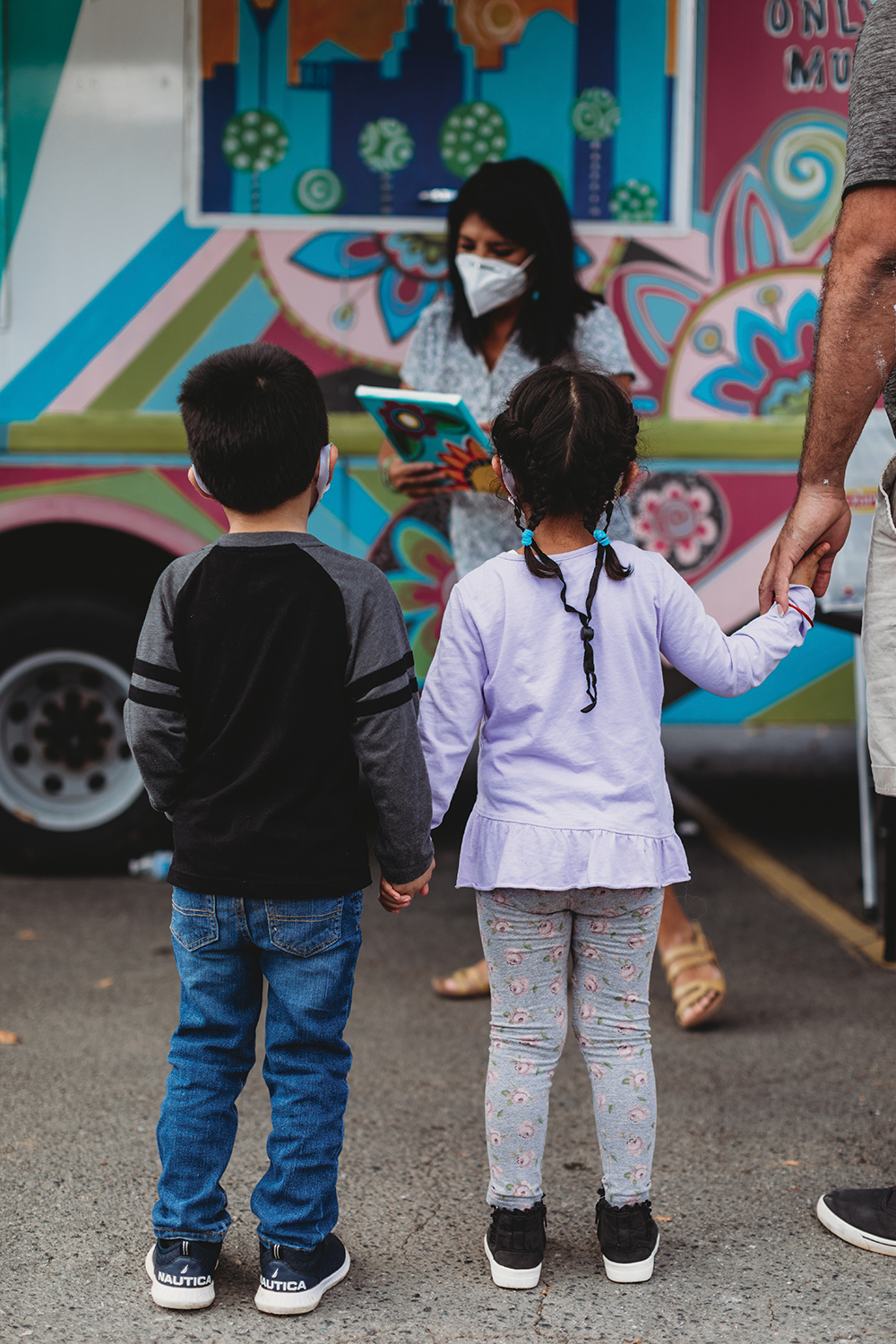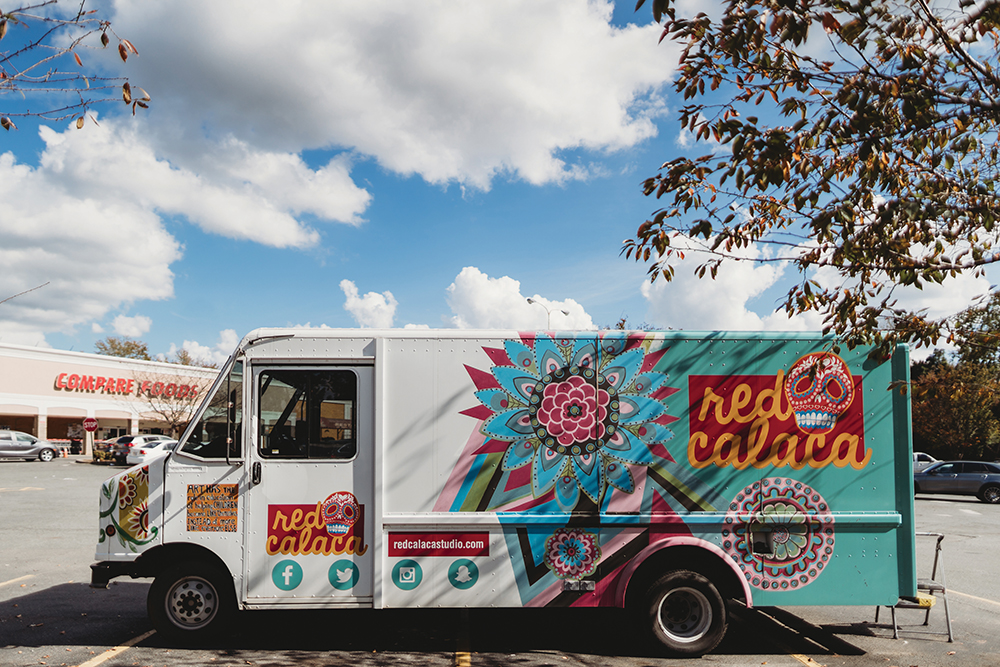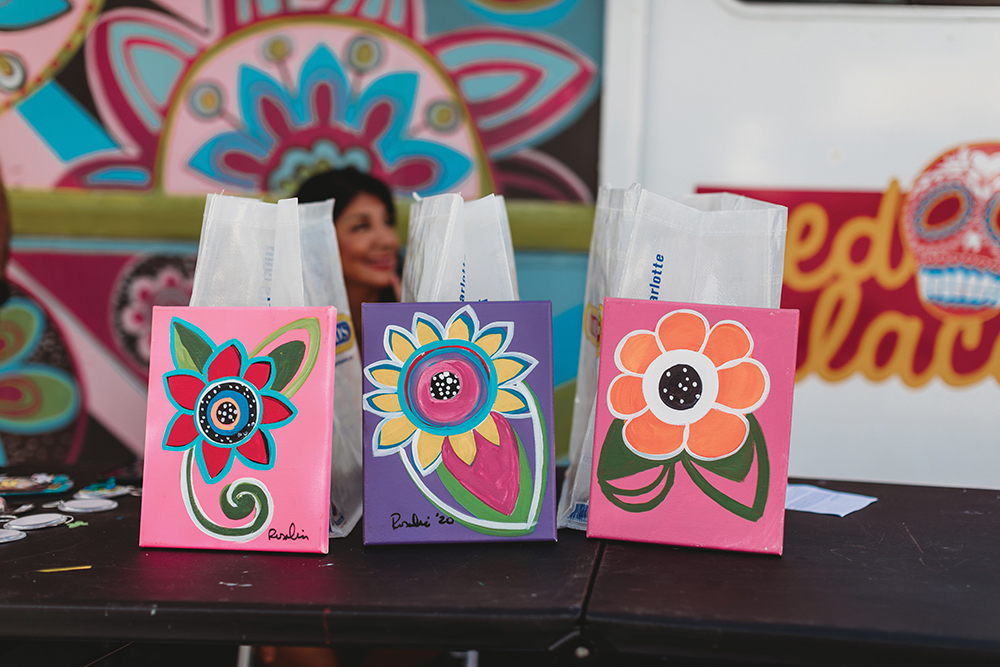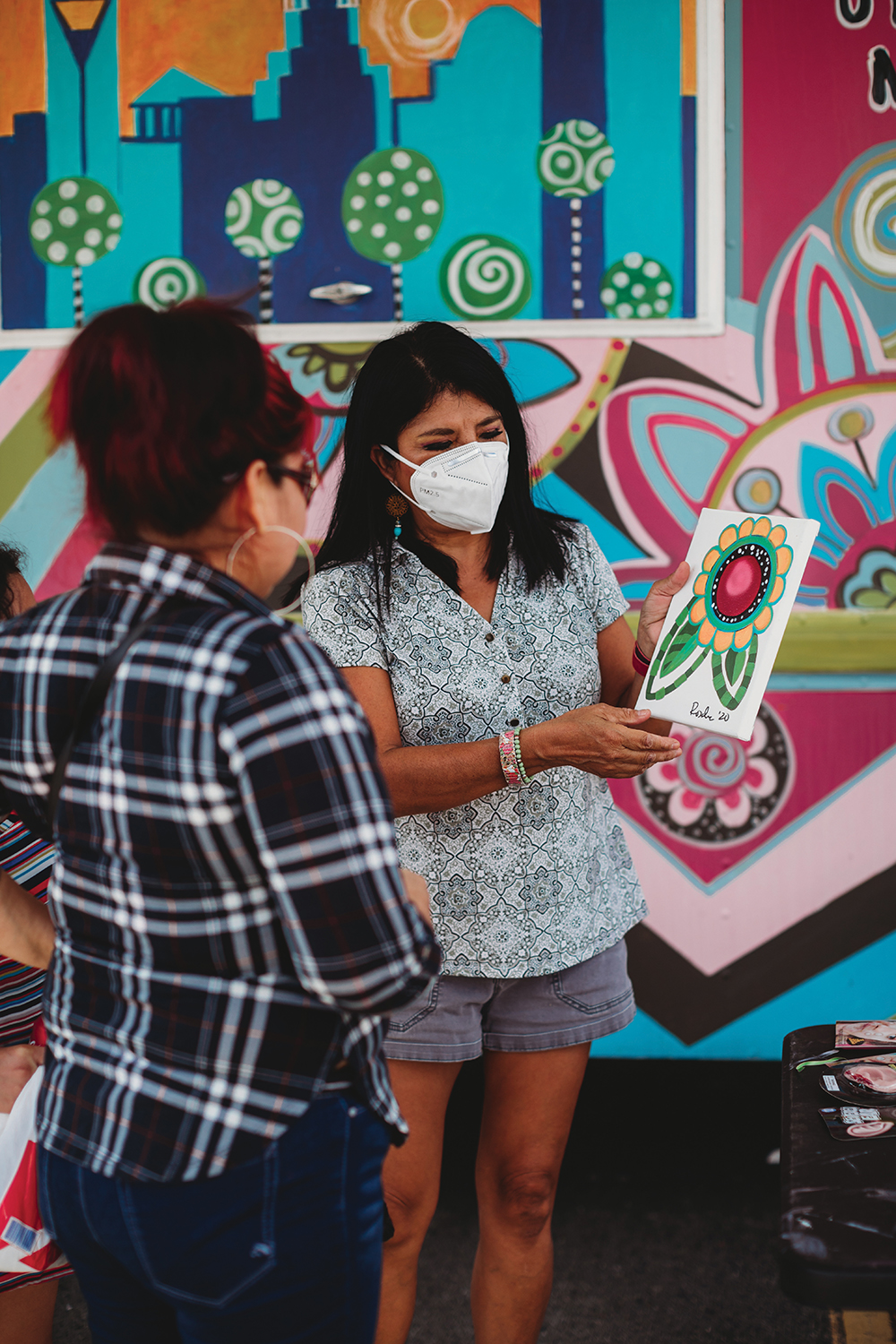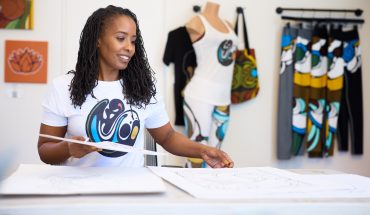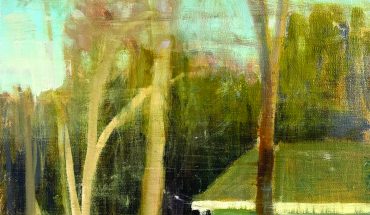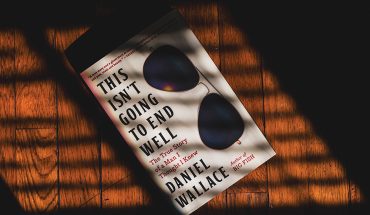A Charlotte artist finds a way to help the Latinx community amidst COVID-19 with her paintings.
by Wiley Cash | photography by Mallory Cash
People begin arriving at 2 p.m. sharp on a Saturday afternoon at the Compare Foods Supermarket on Sharon Amity in east Charlotte: elderly men and women, families with small children, single mothers with babies on their hips—each of them carrying a distinctly different painting of bold, colorful flowers on 8×10 canvases. A few people appear uncertain, others seem excited to discover the source of the mystery that has brought them together. A message on the back of each painting has instructed them to arrive at this location on this day and at this time.
Over the past several days, the paintings—a hundred of them, in fact—have been found scattered around the Queen City on park benches, at bus stops, and inside laundromats, places that one does not expect to find works of art, especially art of this caliber. The artist, Rosalia Torres-Weiner, is waiting for them, sitting on a folding chair outside her boldly painted art truck. It’s a repurposed 24-foot delivery truck that, before the pandemic, Torres-Weiner used to deliver art supplies and arts education to the area’s underserved Latinx communities through her Red Calaca Mobile Art Studio program. Today, those communities are coming to her.
Some people arrive speaking Spanish, others English, but Torres-Weiner, who was born and raised in Mexico City, moves effortlessly between the two languages, greeting everyone with a warm smile that cannot be denied, even by the mask she wears due to the continued rise in coronavirus cases in North Carolina, where the Latinx population has been particularly affected.
Over the summer, it was reported that Hispanic people make up about 10 percent of North Carolina’s population, but they comprised roughly 46 percent of the state’s coronavirus cases. Torres-Weiner, a self-described “artivist” whose work is fueled by service to her community, felt called to respond to the devastating effects of the COVID-19 crisis.
“All my work comes from the community, and while I obeyed the orders to stay home, I realized that I needed to do something,” she says. She soon found herself asking: “What can I do to produce art and help the Latino community?”
This question led to an idea, and the idea eventually grew into action. Torres-Weiner’s husband, Ben Weiner, who works in technology, has grown accustomed to his wife coming up with these kinds of ideas, ideas that put her art to work in service of the community. He lovingly refers to these moments of inspiration, which he envisions as tiny black beans that grow into something larger, as frijolitos, and he has dubbed his wife’s visionary projects as “Frijolito, Inc.” As usual—and as her husband probably predicted—Torres-Weiner’s ideas on how to confront the pandemic grew.
One day, while bouncing ideas off a friend who is also part of Charlotte’s Latinx community, Torres-Weiner decided that she would find a way to distribute sanitization supplies to underserved communities. Her friend told her that was a great idea, but what people really needed was food. Mothers and fathers were dying of the virus, leaving behind spouses and children who needed support. Yes, they needed supplies to protect their bodies, but they also needed food, especially children, who were going to bed hungry, their physical pain compounded by the emotional pain of losing a parent to the coronavirus.
Pain and beauty: Torres-Weiner was motivated by one and desperate to spread the other, and she recalled a quote from the impressionist painter Claude Monet, “I must have flowers, always, and always.” She knew how to spread beauty, and she decided to paint a hundred 8 x 10 canvases with bold, colorful flowers. But she knew she needed help finding a way to address the pain people were feeling.
Although she has made a living as a professional artist, Torres-Weiner went to college for business administration. “My sister became a lawyer, my other sister became a doctor, so when I told my mother I wanted to be an artist, there was not a choice,” she says. But sometimes mothers know best, and Torres-Weiner admits that her business background has provided the tools she needed to find funding and partnerships for her art projects. For her latest, she reached out to Google Fiber. With their support, Torres-Weiner was able to ensure that for each painting she painted, its new owner would have access to a gift bag containing hand sanitizer, masks, soap and other items. Also, each bag would contain a $50 gift card to Compare Foods Supermarket.
As is often the case when Torres-Weiner executes a plan, her husband is on-site today. Each time someone arrives with their newfound art in hand, Torres-Weiner checks the number on the back of the painting and calls it out to her husband, who is inside the art truck, where the gifts bags are waiting. Out of the 100 paintings Torres-Weiner distributed, 89 find their way back to their creator, and although the new owners get to keep the paintings, many of them cannot believe their good fortune. Surely there is a catch, some of them ask. Others try to return their paintings, certain that such beautiful art cannot have been passed on to them for free.
If you ask Torres-Weiner why she feels compelled to use her art to support her community, she will respond by telling you that this is a community that has always supported her from the moment she and her husband arrived in Charlotte from Los Angeles in the mid-1990s. “I remember when we moved here,” she says, “and we saw a church on almost every corner of the city, and we saw everyone playing baseball and taking their kids to activities, and my husband and I looked at each other and said, This is our city. This place is going to embrace us. And it did. We’ve been here 26 years.”
But others in the city were not as convinced as Torres-Weiner that North Carolina was the place for her and her art. “When I started painting my colorful art, someone said, You need to move to Santa Fe or San Francisco. I’m glad I didn’t listen.” Another time, while she was working on a mural in Washington, D.C., she told someone that she was ready to return home. They asked if she was heading back to Mexico. “No,” she said. “I’m going back to Charlotte, North Carolina. That’s my home.”
But home changes, and artists adapt. Torres-Weiner has adapted, easily blending her Mexican cultural heritage into her work as a Mexican-American artivist living in the South. By way of example, she references cuisine and how foodways can merge cultures and bring people together.
A few years ago, while standing in line at a walk-up Mexican restaurant that had long been a secret kept within the Latinx community, Torres-Weiner noticed the diversity of people waiting with her, and she struck up a conversation with a Black man who was standing behind her. He saw the paint on her clothes, and he asked if she was a painter. She said she was. As a matter of fact, she had painted the nearby mural of the Lady of Guadalupe on Central Avenue. The man told her the neighborhood had once housed primarily Black families, and before that white Charlotteans had made it their home. Now, the neighborhood was home primarily to members of the Latinx community. Torres-Weiner explained that she was painting the mural to welcome them to Charlotte. While they waited for their lunch, Torres-Weiner and the man continued to talk about old landmarks, how communities change, how they maintain their hospitality, how they welcome anyone looking for a home.
Rosalia Torres-Weiner’s career has taken her all over the world, and her work has been featured in major museum collections—it even ended up on the cover of a United States history textbook. But no matter where she goes or where her work is showcased, North Carolina is home. “Last year, I was selected to represent North Carolina for an event in Mexico City that invited one Mexican artist from each state to represent the arts,” she says. “When they chose me, I was so proud.”
The day’s event has ended. The confused and curious people who arrived with a gorgeous painting in one hand are leaving with a bag full of groceries and supplies in the other.
No one is more pleased than Torres-Weiner. It is obvious that her day of service has regenerated her, guaranteeing that she will soon find another way to put her art into action to serve her community. What else can an artivist do but create and serve? “It’s my food, it’s my air,” she says. “It is my Christmas.”
___
For this column, writer Wiley Cash and his wife, photographer Mallory Cash, are traveling across North Carolina to meet our state’s artists. They live in Wilmington, N.C. Cash’s latest novel, The Last Ballad, is available wherever books are sold.

